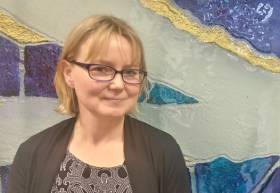Displaying items by tag: International Day of Women and Girls in Science
Marine Institute Celebrates International Day of Women and Girls in Science
The Marine Institute has shared its pride in celebrating the International Day of Women and Girls in Science on Saturday 11 February and the important contributions made by women throughout the organisation.
The theme for the eighth International Day of Women and Girls in Science is IDEAS: Innovate, Demonstrate, Elevate, Advance and Sustain: “Bringing everyone forward for sustainable and equitable development.”
“As a scientific organisation and a State Body, the Marine Institute is committed to promoting gender equality and access to opportunities be they professional roles, training programmes, research related funding or opportunities to network with like-minded individuals,” says Patricia Orme, director of corporate services at the Marine Institute.
“We invest in programmes and actions that encourage the participation of women and girls in all aspects of marine science and technology. We believe that a diverse workforce is essential for achieving our mission of advancing knowledge and understanding of the marine environment.”
The Marine Institute, which has a staff of 241 employees, supports a “strong and inspirational” workforce of female employees at 50.6%. The organisation says it continues to recognise that its employees’ skills, experience, diversity and passion for the marine are central to the work that is undertaken for the government and other partners.
“We are delighted to celebrate the International Day of Women and Girls in Science,” Orme added. “By highlighting the contribution and achievements of women in marine science and sharing their passion for the work that they do, they can inspire the next generation of female scientists from all backgrounds to pursue careers in this field. We have women working in science, technical analysis and research, and many working in policy, maritime development, as well as corporate roles.”
The Marine Institute will share photos, animations and profiles of its women scientists to celebrate their achievements, their study and career paths and the work they do at the Marine Institute. Follow the hashtag #WomenInScience on the Marine Institute’s social media channels on Facebook, Twitter and Instagram for highlights of the important impact of their work.
The International Day of Women and Girls in Science is an annual event for the United Nations that aims to promote gender equality and the empowerment of women and girls in science.
Since 2016, it has been an important platform for discussing ways to address the underrepresentation of women and girls in science, technology, engineering, and mathematics (STEM) fields. This underrepresentation is a major barrier to achieving the United Nations Sustainable Development Goals, which include ensuring equal access to education and promoting gender equality.
According to UNESCO, only 28% of researchers worldwide are women, and even fewer hold senior positions. By highlighting the contributions of women and girls in science and promoting their participation in STEM fields, the International Day of Women and Girls in Science helps to pave the way for a more inclusive and sustainable future.
Scientists Urge Women & Girls To Follow Their Passion For STEM
#MarineScience - Today, Sunday 11 February, Inland Fisheries Ireland (IFI) is marking International Day of Women and Girls in Science by highlighting the key role that women play in the organisation.
According to UN Secretary-General António Guterres: “We need to encourage and support girls and women achieve their full potential as scientific researchers and innovators.”
As an organisation, IFI carries out scientific fisheries research, monitoring and investigations which aim to manage, improve and protect the inland fisheries resource.
A board member of IFI, Dr Frances Lucy is also chair of the Environmental Sciences Association of Ireland. She is head of the Department of Environmental Science and director of the Centre for Environmental Research Innovation and Sustainability at the Institute of Technology, Sligo.
“My advice to young girls and women interested in science is this: follow your passion, let no-one discourage you,” she says.
“It is harder for women, though, because women face the challenge of trying to balance career, children and family. Never underestimate yourself.
“Science is a wonderful discipline and is very rewarding. It’s a career in its own right, but it also offers encouragement to others and makes an impact on science and on society.”
IFI staff member Dr Fiona Kelly is a senior research officer. Dr Kelly heads up a large team specialising in research on various freshwater fish species and has been interested in science since she was a child.
Growing up in Kildare and then Kilkenny, beside the Rivers Liffey and Barrow, her father nurtured her interest in nature, leading to her being an exhibitor at the annual Young Scientist Expo in Dublin’s RDS, before going on to earn a BSc (Hons) in zoology and a PhD in freshwater ecology at University College Dublin.
“As a career, science is extremely interesting and rewarding. The work we do in Inland Fisheries Ireland has great variety and diversity,” she explains. “It’s not just a desk job, you get to work outdoors on rivers, lakes and estuaries on a regular basis.
“For example, I am currently leading the team who carry out the fish monitoring for the Water Framework Directive, to assess the status of fish stocks across the country.”
Dr Kelly says Irish women scientists in the environmental and fisheries sector are well regarded.
“As an island nation, we have a different perspective, so we have much to offer. For instance, I’m on the EIFAAC Technical and Scientific Committee, a sub-committee working under the aegis of the Food and Agriculture Organisation of the United Nations. Irish scientists, male and female, are regular speakers at international conferences.
“It’s a varied and exciting career I would encourage any girls and women who are interested in science to pursue it as a career.”
Wise words of advice as we celebrate UN International Day of Women and Girls in Science.





























































